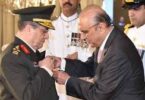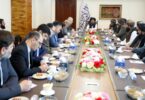Rifaqat Ullah Razarwal
CHARSADDA: For the first time in Charsadda district of Khyber Pakhtunkhwa, a government ‘Public Library Charsadda’ has been opened for the public and students at a cost of about Rs. 9.75 million. The library was established two years ago and now fully operational for the public in October 2020, where about 75,00 books are kept.
The library has books, newspapers and magazines with different titles. According to library officials, students, the public and children can study here and take books with himself after membership. Shehla Tahir, head of the library, told to The Frontier Post that the library was built in 2018 at a cost of Rs. 9.75 million.
“Since the security situation in the area was not good, security forces had been stationed here for almost two years to restore peace. After their departure, the library opened for public”, she explained. Shehla Tahir said that the library has about 7500 books on various subjects including philosophy, history, literature, agriculture, reference books for research and geography.
She said that after one year of operation of the library, more than 100 students, M.Phil, Ph.D, children and other study enthusiasts have registered with the administration for only Rs. 300, added “students can study in a silence environment and even take books home with himself “. The library is located on an acre of land near Charsadda Post Graduate Padang. The library also has a canteen, washrooms, a digital library and a hall with 300 chairs for academic gatherings.
Most of the students have expressed reservations about the library’s working hours and said that the library is open from Monday to Friday from 9 am to 4 pm while it is closed on Saturdays and Sundays,so the students deprived of reading books. Talking about working hours, Shehla Tahir said that the library is newly opened which is facing many problems like no alternative system for electricity, lack of security and staff during.
“If the Archives and Library department of KP provides us a superintendent, senior clerk, cataloger, two librarians, two class fours, a gardner and a peon, the library can be able to run on second shift on Saturdays and Sundays”, she demanded. While the Department of Archives and Libraries at in Khyber Pakhtunkhwa, where an official, speaking on condition of anonymity, said that government libraries have been set up in 18 districts of Khyber Pakhtunkhwa. But the budget allocation from the provincial government is very low.
The department said that the government should provide funds for alternative electrical system, photostat machined, new books and other facilities in all libraries so that students could continue their studies in a peaceful environment. Shehla Tahir said, the library has aslo a digital library system through which students can read the books of world’s largest library, the British Library London, the Congress Library, and the New York Library, but students are unable to study due to heavy load shedding.
Fazal Haleem, a student who’s preparation for the competitive examinations, said that the establishment of the library in Charsadda is no less than a blessing for the students. Fazal Haleem says, “In the absence of a library, we used to order books from outlying cities of Pakistan, which cost a lot of time and money, but getting all kinds of books here has reduced our expenses.”
Kazim Ali Shah, who has a degree in engineering from Comcast University Abbottabad, said that after graduation from the university, he wanted to be associated with books. “There needs to be a conducive environment for study and I am taking advantage of these facilities in the library,” he said. Government and non-government retired persons are also seen in the library. Bashir Rabbani, a former school principal and educationist, says that “despite the age of social media, the usefulness of the book is still there”. He said that the use of social media among the youth has become a major challenge in front of books but teachers in schools, colleges and universities need to motivate students towards the importance of books.






